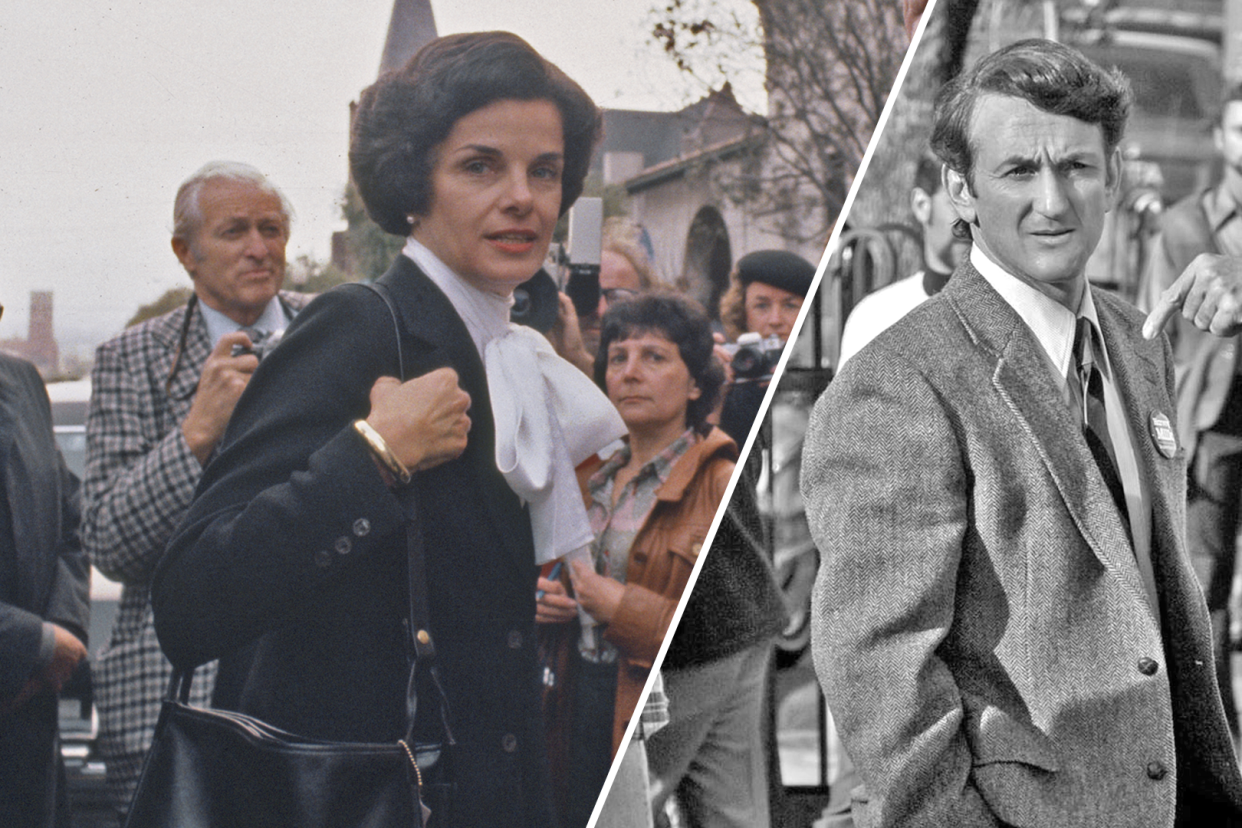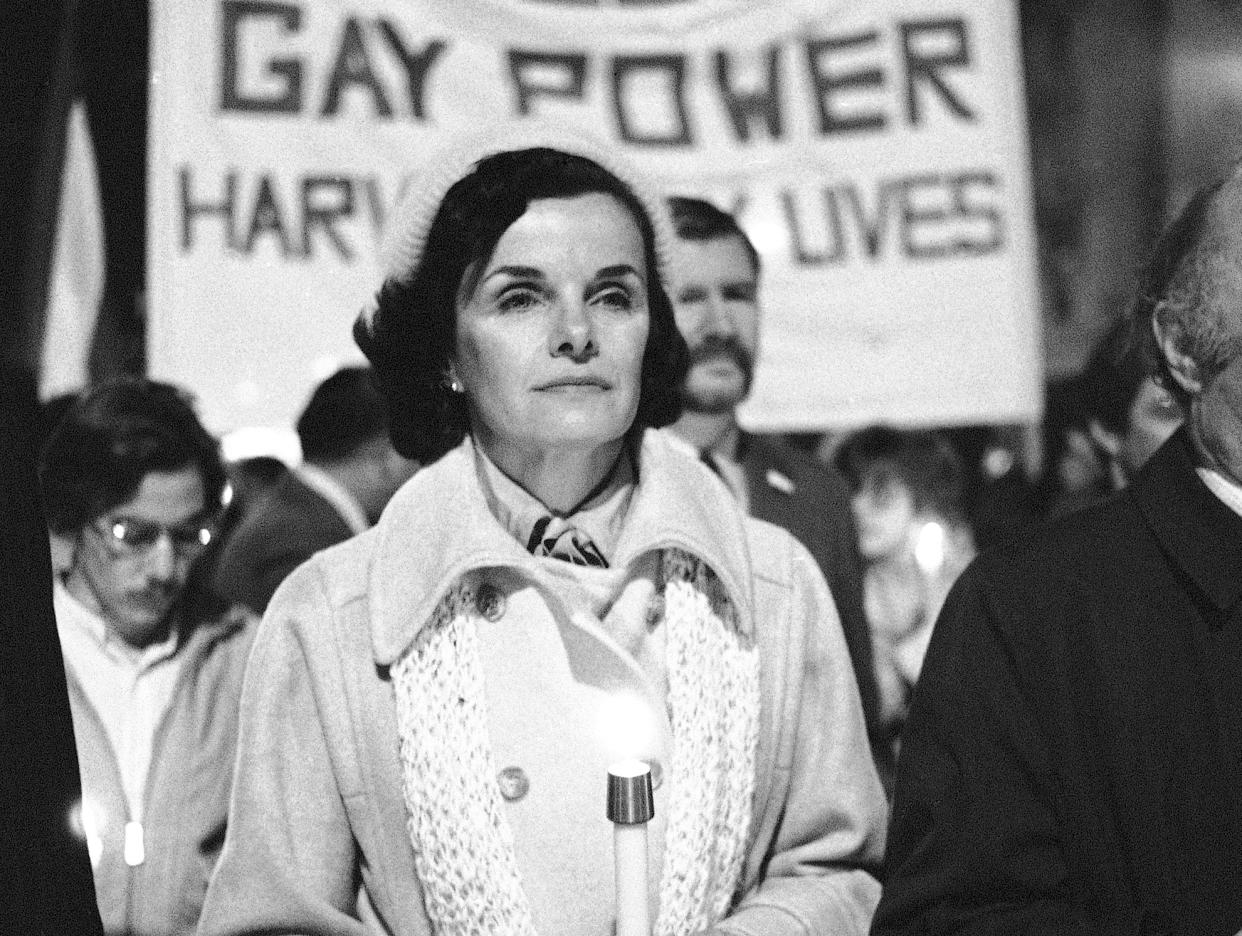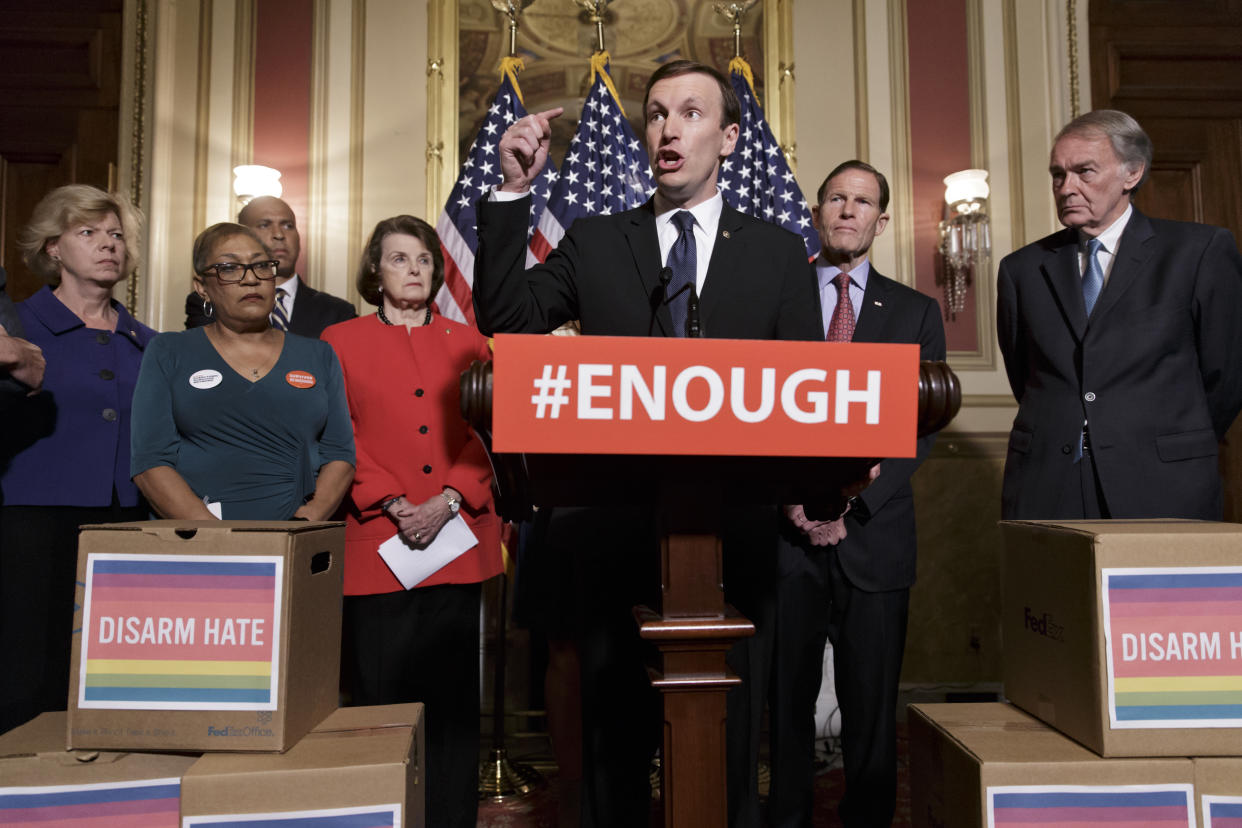How 'Milk' captured the moment Dianne Feinstein became an LGBTQ ally: 'His death opened her eyes,' says screenwriter Dustin Lance Black

Dianne Feinstein, the six-term Democratic senator who died at her home Friday at the age of 90, was hailed by fellow politicians, friends and constituents as a fierce advocate for women and a staunch ally of the LGBTQ community.
Her journey to the U.S. Capitol began at San Francisco City Hall — and one of the defining moments of her life took place while she was a rising local politician thrust into the national spotlight during a horrible tragedy: the murders of Harvey Milk, the first openly gay man elected to office in California in 1977, and San Francisco Mayor George Moscone by a former city supervisor, Dan White, on Nov. 27, 1978. Feinstein, then the president of the Board of Supervisors, was the first to discover the bodies.
The incident played out on movie screens 30 years later in the film Milk, starring Sean Penn in the title role. As depicted in the film, directed by Gus Van Sant, Feinstein stood on the steps of City Hall and made the public announcement of their deaths.
Filmmaker Dustin Lance Black, Milk's Oscar-winning screenwriter, tells Yahoo Entertainment that it was important to capture the traumatic scene authentically because it proved to be a transformative moment not only for Feinstein, but for the future of the LGBTQ rights movement.
“It was his death that opened her eyes and ‘activated’ her,” he said Friday, hours after the announcement of Feinstein's death. At the time, he says, Feinstein was considered “too conservative for San Francisco,” and was even known to spar with Milk (and side with White) on several LGBTQ issues. But witnessing such senseless anti-LGBTQ violence firsthand, she would later attest, changed everything.
Later in life, Feinstein became an advocate for stricter gun laws, authoring a 1994 assault weapons ban (which expired in 2004) as well as a staunch LGBTQ ally by supporting marriage equality and vehemently opposing the military's “don’t ask, don’t tell” policy, which forced LGBTQ service members to stay closeted up until it was repealed by President Barack Obama in 2010.
Black recalls an intimate conversation he had with Feinstein, in 2008, about the moment she found Milk's lifeless body. “She saw Harvey’s feet sticking out of the supervisor’s office, and then she saw the bullet holes. She reached to get his pulse and got blood on her hands because he’d been shot in the head.”
“That was the moment,” says Black, “she began to understand the gay rights struggle.”
‘Dianne Feinstein plays herself’
In Milk, Van Sant and Black decided to use real archival footage of Feinstein on the steps of City Hall. Black says they only used a stand-in to film the back of Feinstein in a brief, blurry shot.
“Dianne Feinstein plays herself,” Black says plainly. “That came after a lot of research where we thought, Should we have someone play her? And I thought not, because so much of that part of the story seemed stranger than fiction. I wanted people to know from the outset that this was real: This really happened, so pay attention. And that was best done by Dianne herself. No one’s going to play Dianne better than Dianne.”

Feinstein's presence is subtle in the film — largely because, Black notes, the archival footage is so relevant to queer history that he wanted to make sure it was seen to its full effect by younger audiences, many of whom might not have known about Feinstein, Milk or Moscone before watching the movie.
Besides, he points out, Feinstein's real transformation takes place after the murders — and well after the White Night riots, a series of violent events sparked by queer activists outraged by White’s infamous “Twinkie defense,” when his lawyers argued that his intake of too much junk food altered his mental and emotional state. The predominantly straight jury bought it, sentencing White to just seven years in prison. He wound up serving five and died by suicide two years after being released.
“It was a more complicated moment than people know,” Black says of Feinstein's trauma, which ultimately “changed the course of her political career forever.”
'A watershed moment in LGBTQ history'
California State Sen. Scott Wiener, whose record includes spearheading trans rights and HIV prevention in the state, says Feinstein championed the gay community during a time when no one else would — and that films like Milk aim to remind queer youth of their history.
“Young LGBTQ people need to understand their history, who went before them, and on whose shoulders they stand,” he told Yahoo. “She deeply invested in fighting HIV/AIDS to the point where San Francisco was spending more than the entire federal government in the response. Because of her leadership, we developed the ‘San Francisco model’ for HIV prevention and care, which is now a world model on how to effectively fight HIV/AIDS. Dianne was not a member of our community, but she certainly played an important role at a critical time in history.”
That's a sentiment shared by Annise Parker, Houston’s first openly gay mayor and current president of the LGBTQ+ Victory Fund, who recalls vividly the murder of Harvey Milk.
“Milk captured a watershed moment in LGBTQ history and made it real for the world,” she told Yahoo Entertainment. “I remember hearing of the shooting, and later the White Night riots, from friends in real time. It was a different era: few news sources, no 24-hour news coverage, no social media. Outside of San Francisco and apart from the core group of LGBTQ rights activists, the import of this event quickly faded from memory.”
Meanwhile, California state Rep. Mark Takano, the first gay person from California (and first-ever gay person of color) to serve in Congress, explains his connection to Feinstein.
“As someone who was publicly outed in 1994, Sen. Dianne Feinstein’s leadership was personal to me,” he told Yahoo. “Feinstein was one of only 14 senators who voted against the Defense of Marriage Act, legislation that denied my community the right to marry,” which is why, he says, it’s never been more important to honor her legacy now.

Other gay leaders, like former Pennsylvania state Rep. Brian Sims, says Milk allows viewers to learn of Feinstein’s LGBTQ record later in life, which he describes as “nothing short of remarkable.”
“Throughout her lifetime, she consistently stood as a stalwart ally for our community, pushing for legislative change that reshaped our nation for the better,” he told Yahoo Entertainment. “From advocating for marriage equality to fighting against discrimination in the workplace, Senator Feinstein’s dedication to LGBTQ+ equality was instrumental in driving meaningful progress.”
Jonathan Lovitz, a gay Biden administration official with the Department of Commerce, adds that Feinstein “took the fighting spirit of Harvey Milk and infused it in her commitment to LGBTQ Americans through vocal advocacy and national policy.”
“I’m glad she’ll be remembered forever in the history books and on film in Milk,” he says. “There are more women and LGBTQ people in public service today because Dianne Feinstein fought so hard to put seats at the table for all of us.”
‘Change and transformation’
Black, whose upcoming Rustin stars Colman Domingo as the pioneering gay Black activist Bayard Rustin, stresses that Feinstein's LGBTQ record isn’t perfect — and that’s OK (or at least it should be).
“Feinstein had the ability to shift and change, which she did many times,” he said. That’s a message he hopes young voters can interpret as an attribute, rather than a liability.
“We tend to disparage politicians with purity tests,” Black continued. “Certainly, early in her career there were things that gay people objected to” — like opposing the 1978 gay rights bill and in 1984 refusing to allow a rainbow flag to fly at City Hall during Pride Month. Still, she was able to “learn and evolve.”
“When a politician shows a willingness to learn and change and transform, I see that as a positive thing,” Black said. “In that way, I see her transformation from someone who didn’t quite understand or accept queer people to where she was at the end: a staunch ally.”
“The movement needs more of that. We need to accept converts. And she was one.”
